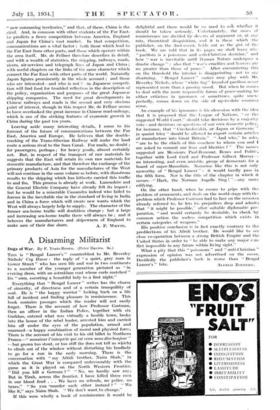A Disarming Militarist
Dogs of War. By F. Yeats-Brown. (Peter Davies. Os.)
Tim is " Bengal Lancer's " counterblast to Mr. Beverley Nichols' Cry Havoc : the reply of " a quiet, grey man in Gower Street " who has seen life and war in two continents to a member of the younger generation pictured as " in evening dress, with an astrakhan coat whOse curls matched " his " own, escorting a beautiful lady to a first night."
Everything that " Bengal Lancer " writes has the charm of sincerity, of directness and of a certain tranquillity of soul. He is " the happy warrior " looking back on a life full of incident and finding pleasure in reminiscence. This book contains passages which the reader will not easily forget. There is the account of' how Professor Coatman, then an officer in the Indian Police, together with six Gurkhas, entered what was virtually a hostile tOwn, broke into the house of the rebel leader, arrested him and carried him off under the eyes of the population, armed and unarmed—a happy combination of moral and physical force. There is the account of his visit to his old billet in Northern France—" monsieur l'interprite qui est venu nous dire bonjour" —but grown too stout, or too stiff (he does not tell us which) to climb out of the window without disturbing his landlady to go for a run in the early morning. There is the conversation with " my Afridi brother, Naim Shah," in which the Great War is compared unfavourably with the game as it is played on the North Western Frontier. " Did you kill a German ? " " No, we hardly saw any. But in Tirah, across the frontier, I have killed three men in our blood. feud . . . We have no schools, no police, no
taxes." " So you `murder each other instead ? " We like it," says Naim Shah. " We don't w.ankto change."
If this were wholly a book of reminiscence it would be delightful and there would be no need to ask whether it should be taken seriously. Unfortunately, the oases of reminiscence are divided by deserts of argument or, at any rate, theoretical disquisition, and it is these which the publisher, on the dust-cover, holds out as the gist of th: book. We are told that in its pages we shall learn why " pacifism is a poisonous and anti-Christian doctrine," and hOw " war is inevitable until Human Nature undergoes a drastic change " : also that " war's cruelties and horrors are no greater than those of peace." After encountering this on the threshold the interior is disappointing—not to say disarming. " Bengal Lancer " makes easy play with Mr. Beverley Nichols, whose "white flag" brand of pacifism never represented more than a passing mood. But when he comes to deal with the more responsible forms of peace-making he either criticizes in ignorance or sometimes, quite unex- pectedly, comes down on the side of up-to-date common sense.
An example of his ignorance is his obsession with the idea that it is proposed that the League of Nations, " or the suggested World Court," should take decisions by a majority vote—and decisions on questions of our own domestic policy, for instance, that " Czechoslovakia, or Japan or Germany " (a quaint trio) " should be allowed to export certain articles of manufacture into Great Britain." " And who," he asks, " are to be the chiefs of this conclave to whom you and I are asked to commit our lives and liberties ? " The names suggested are Messieurs Paul-Boncour, Benes and together with Lord Cecil and Professor Gilbeit Murray— an interesting, and even amiable, group of democrats for a board of super-Mussolinis. Nonsense like this is not only unworthy of " Bengal Lancer " : it would hardly pass in the fifth form. Nor is the title of the chapter in which it occurs—" Hark, the Norman Angelis Sing "—any more edifying.
On the other hand, when he comes to grips with the problem of armaments, and deals on the world-stage with the problem which Professor Coatman had to face on the occasion already referred to, he lets his prejudices drop and admit-3 that " it might be possible," after suitable diplomatic pre- paration, " and would certainly be desirable, to check by common action the useless competition which exists in certain categories of weapons."
His positive conclusion is in fact exactly contrary to the predilections of his Afridi brother. He would like to see close co-operation between a strong British Empire and the United States in order to " be able to make any major con- flict impossible in any future within living sight."
What a pity that this " poisonous " and " anti-Christian " expression of opinion was not advertised on the cover. Decidedly the publisher's bark is worse than " Bengal






































 Previous page
Previous page